Best Apps To Learn Music Theory In 2024, a variety of excellent apps that suit all ability levels and musical interests are accessible for learning music theory. One excellent software is “Yousician,” which gives you real-time performance feedback and interactive courses ranging from fundamental music notation to complex harmonic principles. “Simply Piano,” another well-liked option, is renowned for its user-friendly interface and thorough curriculum that walks users through the foundations of music theory at their own speed.
In order to reinforce important music theory topics, “Musician” provides a variety of enjoyable activities and challenges for those who prefer a more gamified approach. Apart from that, “EarMaster” is unique in that it focuses on ear training. Through a series of interesting activities and tests, users can sharpen their sense of pitch, rhythm, and harmony. Whether you’re a novice or an accomplished musician seeking to further your knowledge of music theory, these applications provide helpful tools to aid in your education in 2024.
What Is factor Consider When To Choosing Best Apps To Learn Music Theory?
To make sure the greatest software for learning music theory fits your needs and tastes, take into account the following factors:
Comprehensive Curriculum: Search for programs that provide a thorough education on a variety of music theory subjects, ranging from fundamentals like rhythm and notation to more complex ideas like harmony and composition.
User-Friendly Interface: For simple navigation and a positive learning environment, an interface must be user-friendly. The app should have well-organized lesson plans, clear instructions, and a user-friendly interface.
Interactive Elements: Interactive elements, such tests, activities, and interactive lectures, improve student interest and retention. Seek for applications that offer possibilities for practical practice together with progress tracking.
Options for personalization: Since every learner progresses differently, it’s critical to select an app that offers personalization. Seek for programs that let you concentrate on particular aspects of music theory, have customizable lesson plans, and adjustable difficulty levels.
Content Quality: The content must be of the highest caliber. Make sure the app provides correct information in an easy-to-understand style. Search for apps created by respectable organizations or instructors of music.
- Advertisement -
Compatibility and accessibility: Take into account how well the software works with the operating systems and devices you own, such as PCs, tablets, and smartphones. Furthermore, accessibility elements like language selections, screen readers, and subtitles could be crucial factors to take into account.
Feedback and Progress Tracking: To keep track of your progress and maintain motivation, feedback systems and progress tracking software are essential. Select applications that let you monitor your development over time and offer thorough performance comments.
Cost and Value: Although many applications have free trials or versions available, others could demand a one-time payment or membership in order to access them fully. Calculate the app’s value for you by weighing its price in relation to its features, quality, and learning objectives.
Here Is List of The Best Apps To Learn Music Theory?
- Yousician
- Simply Piano
- Musician
- EarMaster
- Music Theory Pro
- Tenuto
- Perfect Ear
- Theory Lessons
- Music Theory Helper
- TonalEnergy Tuner and Metronome
- Music Tutor
- Note Trainer
- Teoria
- StaffWars
- Flashnote Derby
- Note Rush
- Music Theory for Beginners
- Complete Ear Trainer
- ABRSM
- Notation Trainer
- Music Theory: Learn & Quiz
- Interval Recognition
- Rhythm Trainer
- Music Theory Toolkit
- Sight Reading Trainer
- GarageBand
- SingTrue
- Uberchord | Guitar Learning
- Easy Music
- Moises
30 Best Apps To Learn Music Theory In 2024
1.Yousician
One of the best applications for learning music theory is Yousician. Yousician offers learners a comprehensive curriculum and an accessible interface that accommodates all ability levels, making it an engaging learning experience. Regardless of your level of experience, the app provides tailored lessons that adjust to your speed and development.
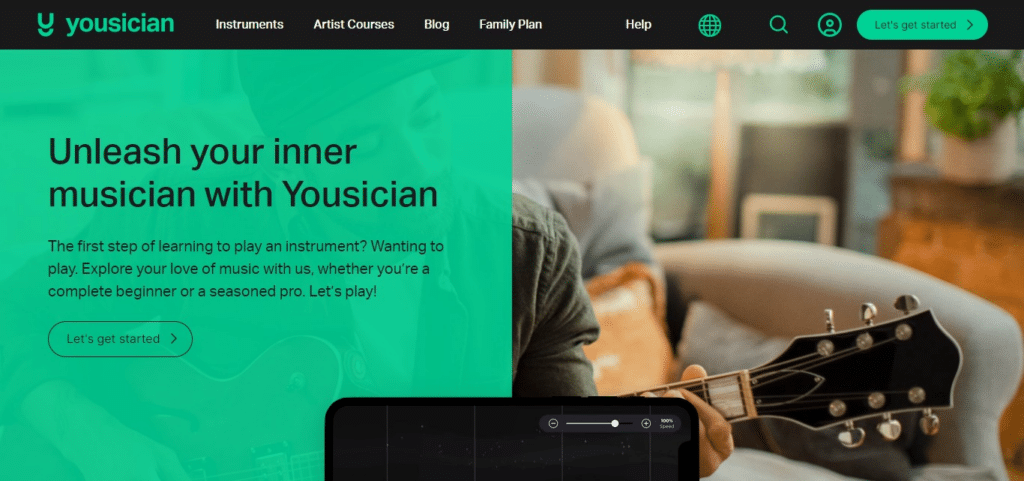
Yousician offers many fundamentals of music theory, from learning basic ideas like notes, chords, and scales to exploring more advanced subjects like harmony and composition. Learning is made interesting and efficient by its interactive features, which include practice tasks and real-time feedback. Aspiring musicians now have a potent tool at their disposal to improve their knowledge of music theory and advance their abilities: Yousician.
2.Simply Piano
Simply Piano is one of the best applications available for learning music theory. All users can study music theory because to its well-structured curriculum and user-friendly design. In a clear and interesting way, Simply Piano leads students through fundamental ideas like notes, rhythms, chords, and scales. Students can practice efficiently and monitor their progress over time with its interactive classes and fast feedback feature.

Regardless of your level of experience, Simply Piano provides a thorough method of teaching music theory that accommodates a variety of learning preferences. Aspiring musicians now have a useful tool to help them grasp music theory more deeply and reach their greatest potential: this app.
3.Musician
The Musician app is a very useful resource for musicians who want to learn more about music theory. With its intuitive design and abundance of instructional materials, Musician provides a customized learning environment that is appropriate for both novice and expert players. The program covers a wide range of topics related to music theory, from the fundamentals of rhythm and notation to more complex ideas like harmony and counterpoint.

Its interactive exercises and courses give students real-world experience and fast feedback, which improves understanding and retention. Additionally, users can concentrate on areas of interest or areas that require work thanks to Musician’s customizable features, which guarantee a unique learning experience. Aspiring musicians now have access to a comprehensive platform with Musician that gives them the knowledge and abilities they need to succeed in their musical endeavors.
4.EarMaster
Without a doubt, one of the best apps for people who want to learn a lot about music theory is EarMaster. EarMaster gives musicians of all skill levels a dynamic learning environment with its extensive library of interactive exercises and tools. The software covers a wide range of music theory elements, from basic ideas like intervals and scales to more complex subjects like chord progressions and harmonic analysis.
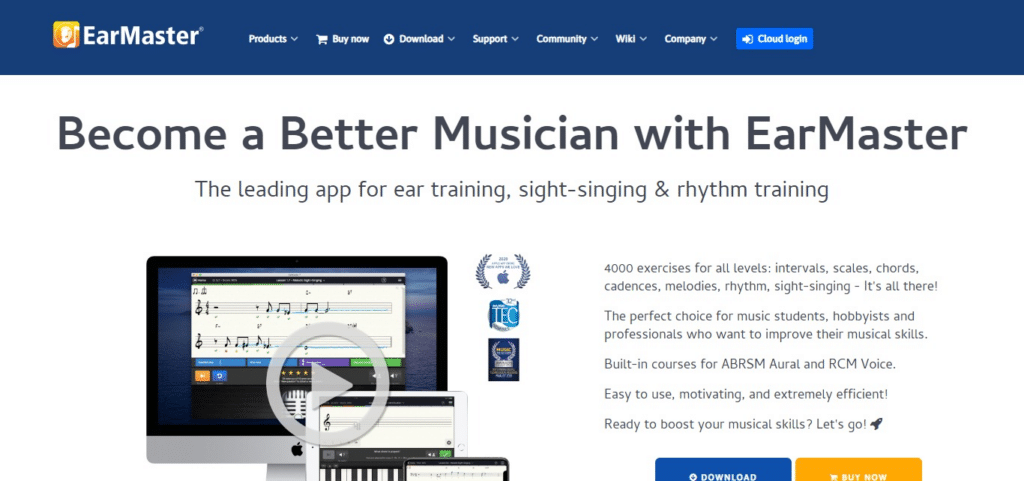
With its well-organized curriculum and adaptable training sessions, users may advance at their own speed and get immediate performance feedback. Additionally, users can strengthen their theoretical knowledge and acquire a sharp ear with the help of EarMaster’s vast exercise library, which includes sight-reading and ear training challenges. Aspiring musicians now have a potent tool at their disposal to improve their knowledge of music theory and hone their abilities to a professional level: EarMaster.
5.Music Theory Pro
For individuals who are keen to explore the complexities of music theory, Music Theory Pro is a highly recommended application. Music Theory Pro is a feature-rich program that accommodates students of all skill levels thanks to its well-organized curriculum and user-friendly interface. The software covers a wide range of theoretical topics, including the intricacies of harmony and composition as well as the foundations of rhythm and notation.

Users may improve their knowledge and sharpen their abilities with its interesting interactive lectures, tests, and activities. Additionally, the use of audio and visual aids by Music Theory Pro improves the learning process by making abstract concepts more concrete and approachable. Aspiring musicians can understand music theory and realize their creative potential with the help of Music Theory Pro’s depth and adaptability.
6.Tenuto
Tenuto is a top app for people who want to learn everything there is to know about music theory. From novices to seasoned musicians, Tenuto’s extensive feature set and intuitive interface make it suitable for learners of all skill levels. The program covers fundamental ideas including note recognition, intervals, scales, chords, and more with a wide range of activities and interactive tools.

Users can concentrate on particular subject areas with its customisable exercises and quizzes, and its progress tracking tool lets them see how much they’ve improved over time. Additionally, Tenuto’s incorporation of visual aids and auditory examples improves the learning process by making abstract theoretical concepts more approachable and understandable. Aspiring musicians can improve their musical proficiency and gain a deeper understanding of music theory using Tenuto’s depth and versatility.
7.Perfect Ear
Many people consider Perfect Ear to be among the greatest applications for learning music theory. From novices to experts, Perfect Ear’s extensive feature set and intuitive user interface accommodate musicians of all skill levels. A wide range of music theory subjects are covered by the program, such as intervals, scales, chords, rhythm, and more. Users can enhance their theoretical knowledge and ear training skills with the use of its interactive courses and activities, which are intended to give practical experience and instant feedback.
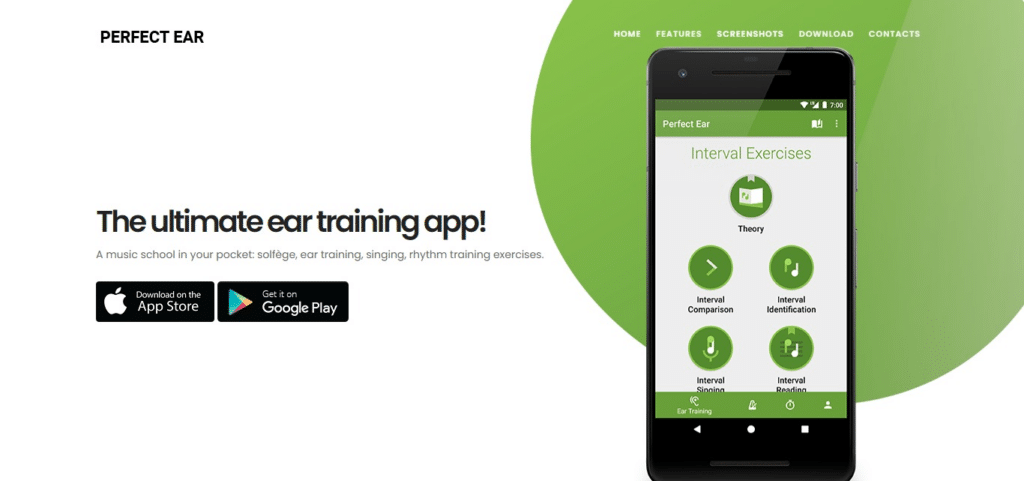
Additionally, Perfect Ear provides training sessions that may be customized to target particular study areas or levels of difficulty. Aspiring musicians wishing to improve their knowledge of music theory can benefit from Perfect Ear’s organized and efficient learning process thanks to its large collection of exercises and quizzes, progress monitoring tool, and other features.
8.Theory Lessons
The Theory Lessons app is a fantastic tool for anyone interested in learning more about the complex field of music theory. Theory Lessons is designed to accommodate learners of all skill levels, from beginners to experienced musicians, with its user-friendly interface and extensive curriculum. Many basic music theory topics are covered in the program, such as notation, scales, chords, harmony, and composition.

Its interactive courses are delivered in an understandable and entertaining style, accompanied by comprehension-enhancing audiovisuals. In order to supplement instruction and monitor advancement, Theory Lessons also provides practical tasks and tests. Theory Lessons offers an invaluable platform for expanding your knowledge and skill in music theory, regardless of whether you’re studying on your own or enhancing your official music education.
9.Music Theory Helper
One of the best apps for learning the nuances of music theory is Music Theory Helper, which is well regarded. With its wide range of functions and easy-to-use interface, Music Theory Helper serves musicians of all skill levels, from novices to seasoned professionals. A wide range of theoretical topics, including notes, intervals, scales, chords, and more, are covered in the program. Its interactive exercises and tutorials are made to give students real-world experience and fast feedback, which helps them grasp musical principles more deeply.
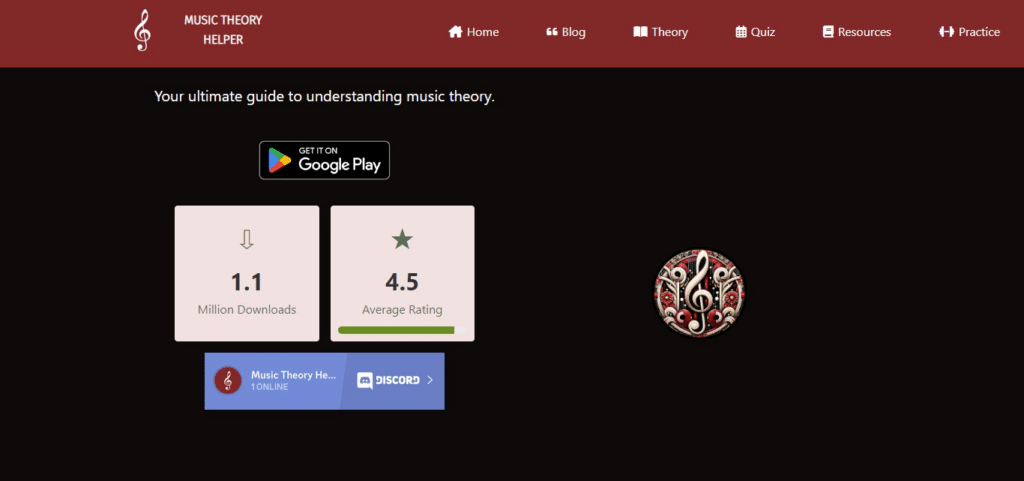
Additionally, Music Theory Helper provides users with tools for measuring their progress and creating personalized learning routes, enabling them to customize their studies to meet their specific needs and measure their development over time. Music Theory Helper is a very useful tool for aspiring musicians to improve their theoretical understanding and musical ability because of its depth and variety.
10.TonalEnergy Tuner and Metronome
TonalEnergy Tuner and Metronome is a great instrument for learning music theory, even though its main uses are for metronome and extensive tuning. This software offers a wide range of functions that cater to musicians of all skill levels and offer a holistic approach to musical instruction. TonalEnergy provides a number of tools for practicing scales, intervals, and even ear training exercises in addition to tuning instruments and maintaining time. Its interactive elements and visual representations facilitate users’ understanding of theoretical topics like pitch, rhythm, and harmony.
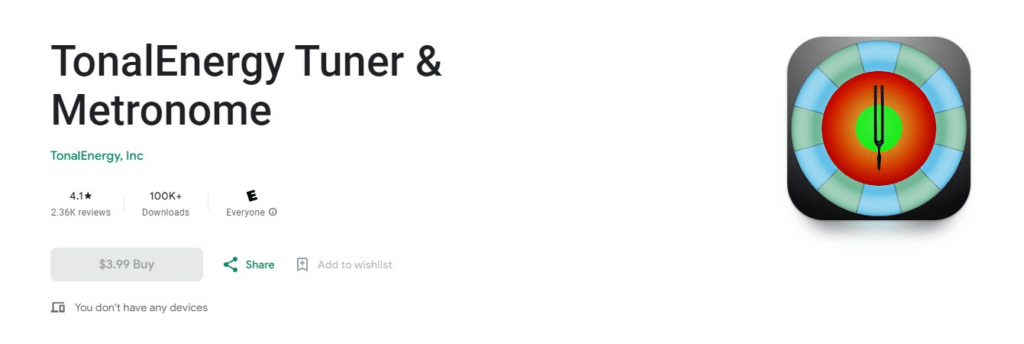
Additionally, users may analyze their performances and monitor their improvement over time with the app’s recording features. TonalEnergy Tuner & Metronome is an all-inclusive platform that will help you improve your knowledge of music theory and your level of musical aptitude, regardless of your level of experience.
11.Music Tutor
Among the best apps for people who want to learn music theory is Music Tutor. From novices to accomplished musicians, Music Tutor accommodates all skill levels with its user-friendly design and extensive curriculum. Notes, intervals, scales, chords, and other basic music theory topics are all covered in great detail in this program.
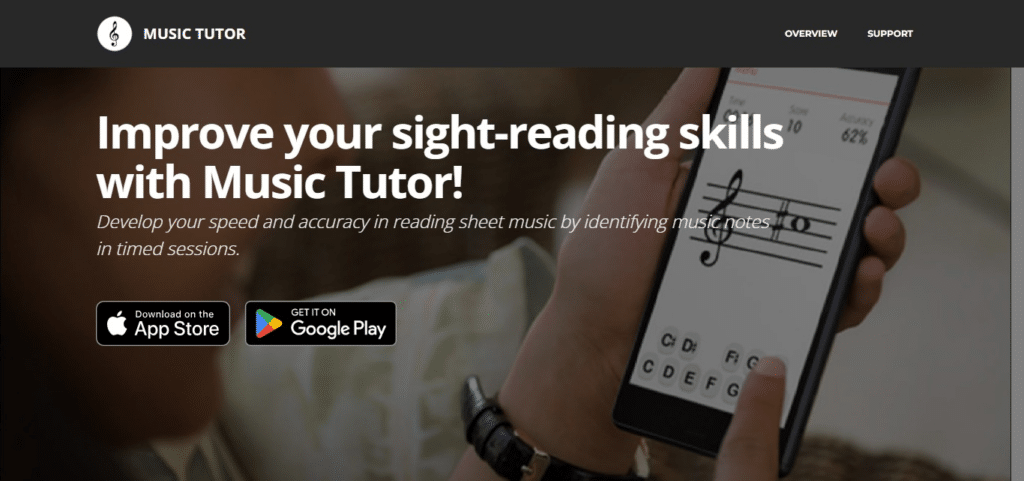
With its user-friendly and visually appealing interactive courses and activities, users can study at their own pace and get immediate feedback on their progress. Additionally, users of Music Tutor can tailor their learning pathways and tests to concentrate on particular subject areas or levels of difficulty. Music Tutor offers an invaluable resource to enhance your comprehension and expertise in music theory, regardless of whether you’re studying on your own or enhancing your official music education.
12.Note Trainer
Most people agree that Note Trainer is among the greatest applications for anyone trying to improve their knowledge of music theory. Note Trainer provides interactive exercises and an intuitive interface that accommodates learners of all skill levels, from novices to proficient musicians. The app’s main goal is to assist users become more proficient at note recognition so they can read notes on staff more quickly and with more accuracy.
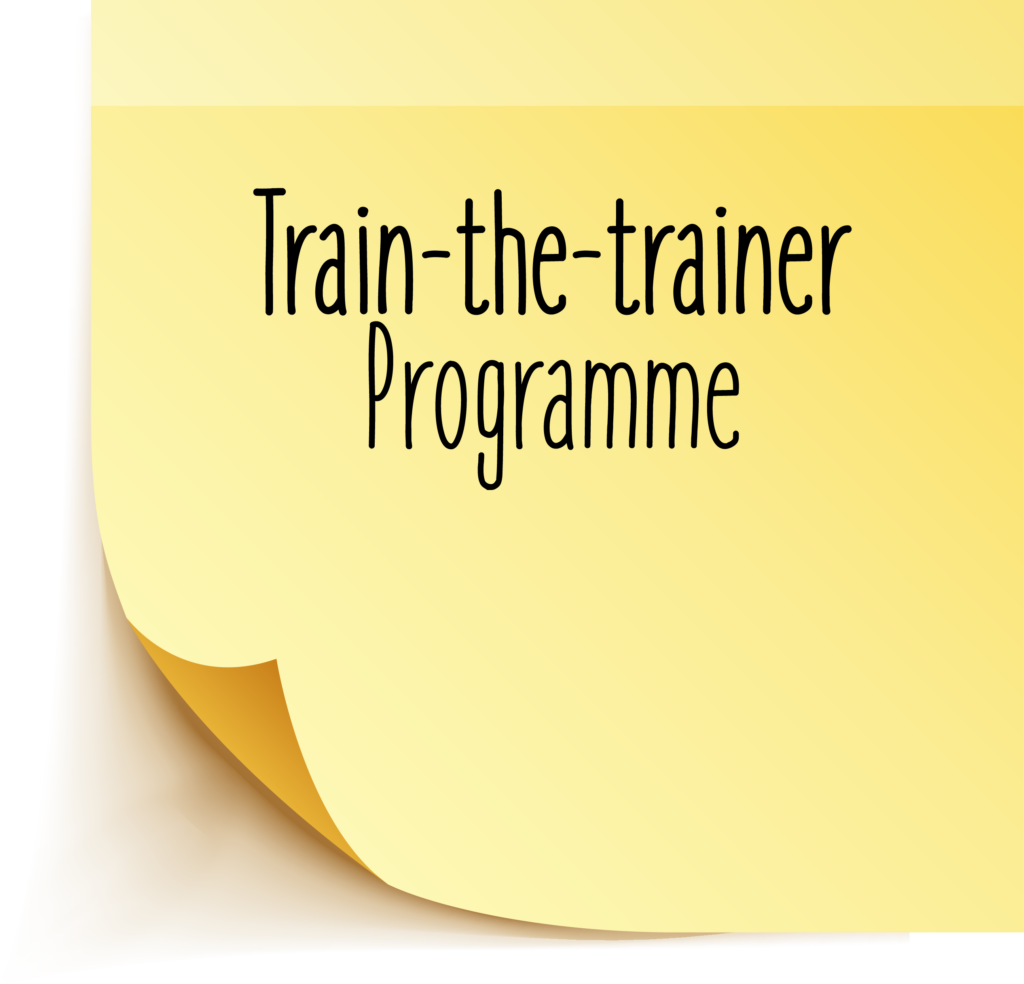
With Note Trainer’s many adjustable training choices, users can choose to practice with particular clefs, ranges, and even instruments. Learning is effective and entertaining thanks to its incremental difficulty levels and intuitive design. Note Trainer provides a comprehensive platform to improve your comprehension of music theory and succeed in your musical endeavors, regardless of your level of experience.
13.Teoria
One of the best apps for people who want to learn more about the nuances of music theory is Teoria. Teoria is well-known for its extensive feature set and intuitive user interface, making it suitable for artists of all skill levels. A wide range of topics related to music theory are covered by the program, such as harmony, chords, scales, intervals, and notation. Its interactive exercises and tutorials are made to give students real-world experience and fast feedback, which helps them grasp theoretical ideas more deeply.
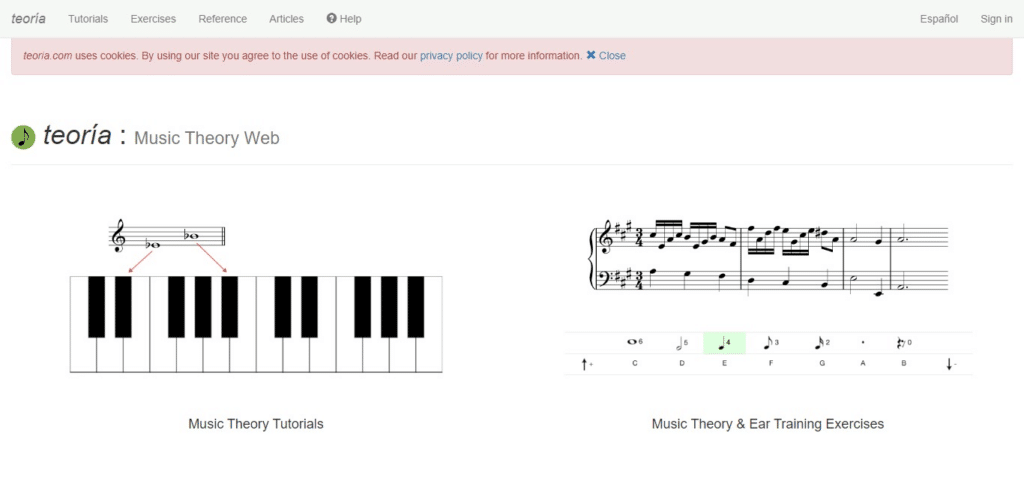
In order to support learning and monitor advancement, Teoria also provides useful resources like ear training exercises and customisable tests. Teoria is a popular choice among students all over the world because of its depth and adaptability, which offer aspiring musicians a priceless tool to enhance their knowledge and proficiency in music theory.
14.StaffWars
One notable app that is well-known for its unique method of teaching music theory is StaffWars. StaffWars provides a unique platform for musicians of all ages and skill levels to hone their note-reading abilities with its captivating gameplay and educational focus. Using the app, players may turn studying music theory into a fun game where they have to identify notes on the staff in order to defend their spaceship. StaffWars provides a customized experience for each user by adapting to their specific learning needs through changeable difficulty levels and customisable settings.

Learning is made efficient and enjoyable by its user-friendly design and instantaneous feedback, which promotes continuous practice and advancement over time. Aspiring musicians can improve their grasp of music theory in a dynamic and entertaining way with StaffWars, whether they use it as a stand-alone learning tool or as an addition to traditional music education.
15.Flashnote Derby
An amazing program called Flashnote Derby was created to make learning music theory enjoyable and productive. The software offers a novel and enjoyable way to hone note recognition and sight-reading abilities with its captivating horse racing theme. In order to race their horses, players must properly identify notes on the staff. As they do so, they will receive awards and move through levels. Because of its configurable features, Flashnote Derby is appropriate for musicians of all skill levels. Users can concentrate on particular notes, ranges, or instruments.
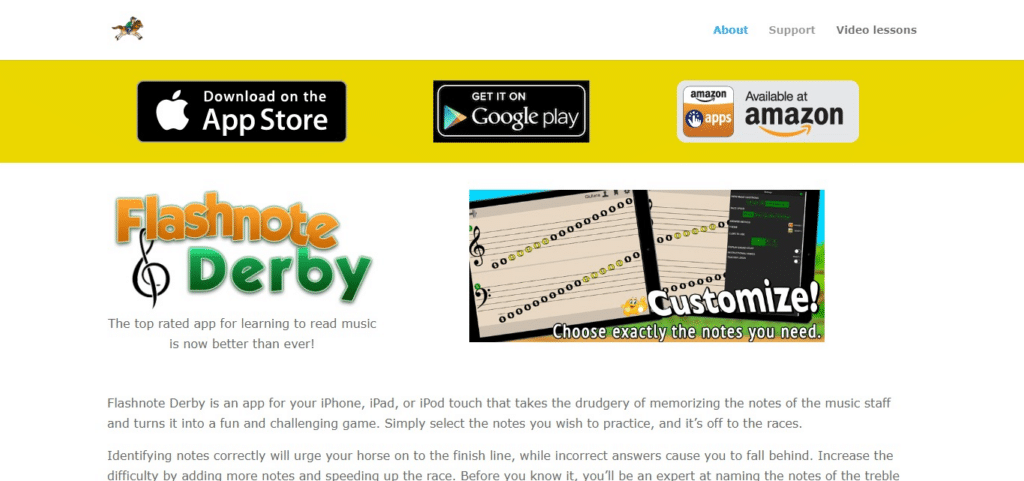
Its competitive component provides an additional degree of incentive, promoting consistent practice and gradual improvement. Aspiring musicians can improve their grasp of music theory and succeed in their musical efforts by using Flashnote Derby, an engaging and interactive learning tool that can be used independently or in conjunction with traditional music education.
16.Note Rush
One of the best apps for people looking to improve their music theory abilities in an entertaining and interesting approach is Note Rush. Note Rush uses a novel way to turn note recognition instruction into an entertaining game. In order to win points for accuracy and speed, users must recognize notes as they tumble down the screen in a race against the clock. Users can customize the app’s settings to suit their own requirements, be it concentrating on particular clefs, ranges, or levels of difficulty, throughout their practice sessions.
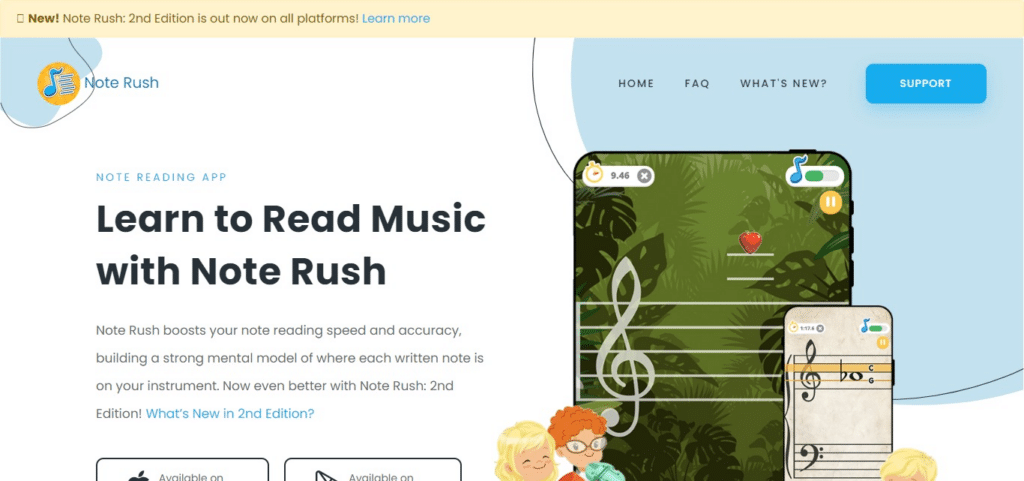
Because to Note Rush’s engaging gameplay and instantaneous feedback, learning is both efficient and pleasurable, encouraging players to keep honing their skills. Note Rush offers a dynamic and engaging platform to improve your comprehension of music theory and succeed in your musical endeavors, regardless of your level of experience. Beginners just starting to learn music theory or seasoned musicians wishing to hone your note-reading skills can both benefit from Note Rush.
17.Music Theory for Beginners
“Music Theory for Beginners” is a fantastic program that aims to teach beginners the principles of music theory in an approachable and entertaining way. The app’s structured curriculum and user-friendly UI make it suitable for users with little to no prior understanding of music theory. “Music Theory for Beginners” simplifies difficult subjects into manageable sessions by going over fundamental ideas including notes, rhythms, scales, chords, and more.

Its interactive elements, such as exercises and quizzes, allow students practical experience and reinforce what they’ve learned. The app also provides audiovisual assistance to improve understanding and memory. “Music Theory for Beginners” provides a thorough and user-friendly foundation to get you started in the field of music theory, regardless of your goals—be they to learn how to play an instrument or just to comprehend the workings of music.
18.Complete Ear Trainer
Many people praise Complete Ear Trainer as one of the most complete and useful apps for studying music theory, especially when it comes to ear training. Complete Ear Trainer serves musicians of all skill levels, from novices to experts, with its wide variety of exercises and interactive features. A vast range of ear training subjects are covered by the program, such as intervals, scales, chords, melodies, and rhythms. Through a series of increasingly difficult activities, its well-organized curriculum helps users enhance their listening abilities methodically.
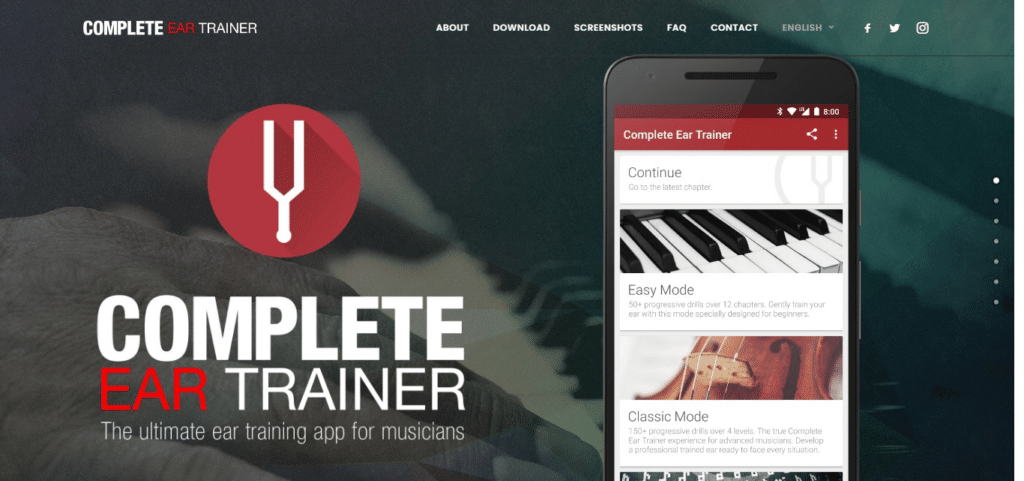
Additionally, Complete Ear Trainer allows for customization, allowing users to concentrate on particular areas of interest or weakness. With its user-friendly layout and instantaneous feedback, the application offers a stimulating and productive educational process. Complete Ear Trainer provides a thorough platform to increase your knowledge of music theory and advance your musical proficiency, regardless of your goal—improving your ear for chords or honing your sense of pitch.
19.ABRSM
Among the most reliable and extensive apps for learning music theory is one provided by ABRSM (Associated Board of the Royal Schools of Music). Because of its long history in music instruction, ABRSM offers students excellent tools and materials created by professionals in the area. From Grade 1 to Grade 5, all levels of the ABRSM music theory exams are covered by the ABRSM Music Theory app, which offers a structured curriculum in line with globally accepted standards.
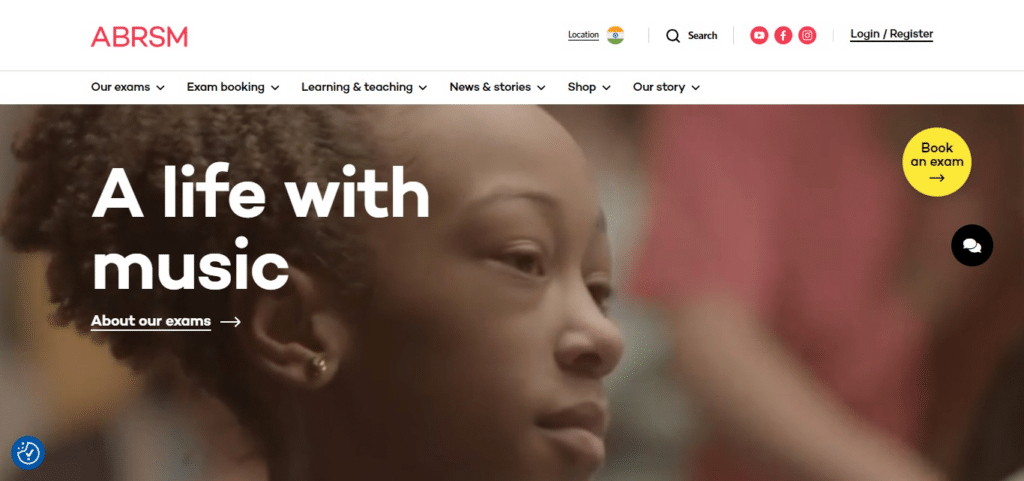
With the purpose of assisting users in gaining a thorough understanding of music theory fundamentals including notation, scales, chords, harmony, and more, the app includes interactive lessons, exercises, and practice exams. With its easy-to-use layout and thorough explanations, the ABRSM Music Theory app is a valuable resource for students of all ages and skill levels, whether they are studying for music theory examinations or just want to expand their understanding of the subject.
20.Notation Trainer
Notation Trainer is a great software for anyone looking to improve their knowledge of music theory through practice with notation. From novices to experienced musicians, Notation Trainer accommodates all skill levels with its user-friendly design and extensive feature set. In order to improve reading and interpreting abilities in musical notation, the app provides a range of activities and drills that cover fundamental concepts including note values, rhythms, key signatures, and more. By choosing particular subjects or degrees of difficulty, users can personalize their learning process and create practice sessions that are specifically catered to their needs.
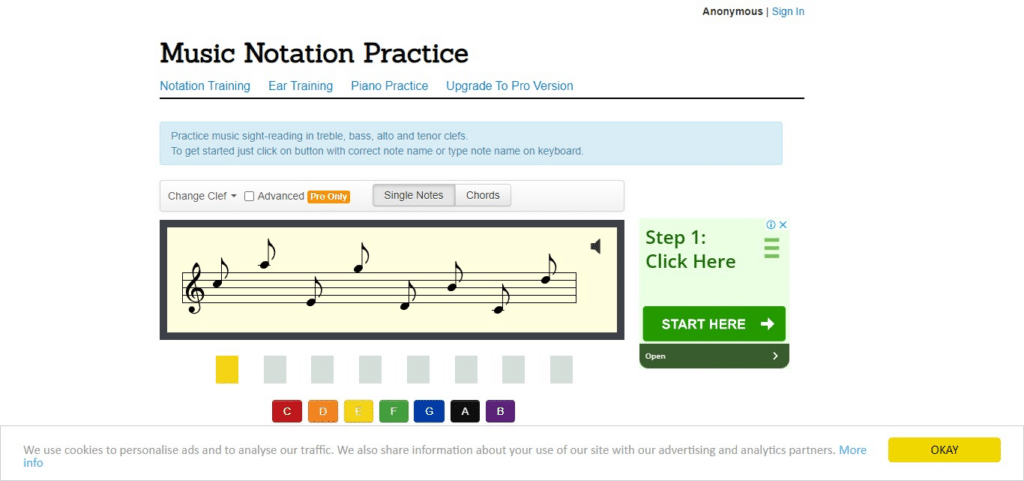
The real-time feedback and progress tracking elements of Notation Trainer facilitate ongoing development and mastery by offering insightful information about areas of strength and improvement. Notation Trainer is a powerful tool for improving notation abilities and musical proficiency that may be used independently or in combination with other music theory tools.
21.Music Theory: Learn & Quiz
For those who want to learn music theory more deeply through interactive instruction and evaluation, “Music Theory: Learn & Quiz” is a standout software. With its comprehensive curriculum and easy-to-use design, this software is suitable for learners of all skill levels, from novices to proficient musicians. Notes, intervals, scales, chords, and other basic music theory ideas are just a few of the topics covered in “Music Theory: Learn & Quiz”.

Its interactive tutorials break down difficult theoretical concepts into easily understood examples and explanations. Additionally, the app allows users to evaluate their progress over time by providing quizzes and practice exams to check comprehension and promote learning. “Music Theory: Learn & Quiz” is an invaluable tool for budding musicians who want to improve their theoretical knowledge and succeed in their musical endeavors. It offers adjustable features and an organized learning strategy.
22.Interval Recognition
Many people consider Interval Recognition to be among the best applications for improving one’s knowledge of music theory, especially when it comes to interval recognition. Interval Recognition is suitable for musicians at every skill level, from novices to experts, thanks to its intuitive design and interactive activities. The program focuses on improving the user’s aural perception of intervals, or the space between two pitches, which is an essential skill for musicians. Users are challenged to properly and efficiently recognize intervals through a series of fun exercises and quizzes.

With the configurable features offered by interval recognition, users can choose which intervals, octaves, or instruments to practice with. Its capabilities for measuring progress and receiving real-time feedback enable ongoing development by offering insightful information about areas for strength and development. Interval Recognition is a useful tool for improving musical ability and honing interval recognition skills. It can be used independently or in combination with other music theory tools.
23.Rhythm Trainer
For those who are eager to get proficient with timing and rhythm in their musical ventures, Rhythm Trainer is a particularly noteworthy program. From novices to seasoned musicians, Rhythm Trainer accommodates all skill levels with its user-friendly interface and extensive feature set. The software provides a range of drills and exercises aimed at enhancing rhythm execution, interpretation, and recognition. In order to improve their rhythmic accuracy and fluency, users can practice various rhythmic patterns, time signatures, and tempos.
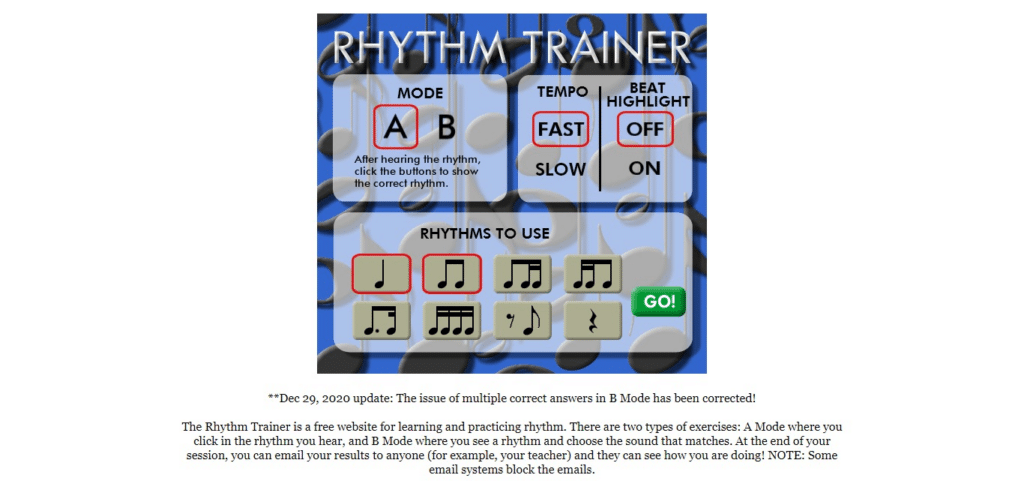
Precise timing and consistent tempo management are guaranteed by Rhythm Trainer’s interactive metronome feature and real-time feedback. The program also has configurable settings, so users can focus on particular rhythmic problems and change the degree of difficulty. Rhythm Trainer is a priceless tool for improving rhythmic ability and musical knowledge, whether it is utilized for solo or group practice, performance, or creation.
24.Music Theory Toolkit
For those who want to learn more about the complexities of music theory, the Music Theory Toolkit app is a unique and all-inclusive resource. With its wide range of functions and user-friendly layout, the program is suitable for learners of all skill levels, from novices to proficient musicians. Numerous essential music theory ideas are covered in the Music Theory Toolkit, including notation, scales, chords, intervals, and more. Its interactive lectures and exercises make difficult theoretical concepts understandable and approachable by presenting them in an engaging and unambiguous manner.

Additionally, the app provides useful resources to help with learning and understanding assessment, like chord progressions, ear training exercises, and interactive quizzes. The Music Theory Toolkit is an invaluable resource for aspiring musicians to improve their musical skill and gain a deeper understanding of music theory, thanks to its structured learning approach and customisable features. With the help of the Music Theory Toolkit, students may study and become experts in the vast field of music theory at their own pace, whether they are using it on its own or in conjunction with traditional music education.
25.Sight Reading Trainer
One of the best programs for musicians trying to get better at sight reading and learn more about music theory is Sight Reading Trainer, which is well known. Sight Reading Trainer accommodates learners of all skill levels, from novices to experts, with its user-friendly design and extensive features. The software provides a range of real-time drills and exercises aimed at improving reading skills for music notation. To ensure a customized learning experience, users can practice exercises unique to their instrument, varying musical genres, and varying levels of difficulty.
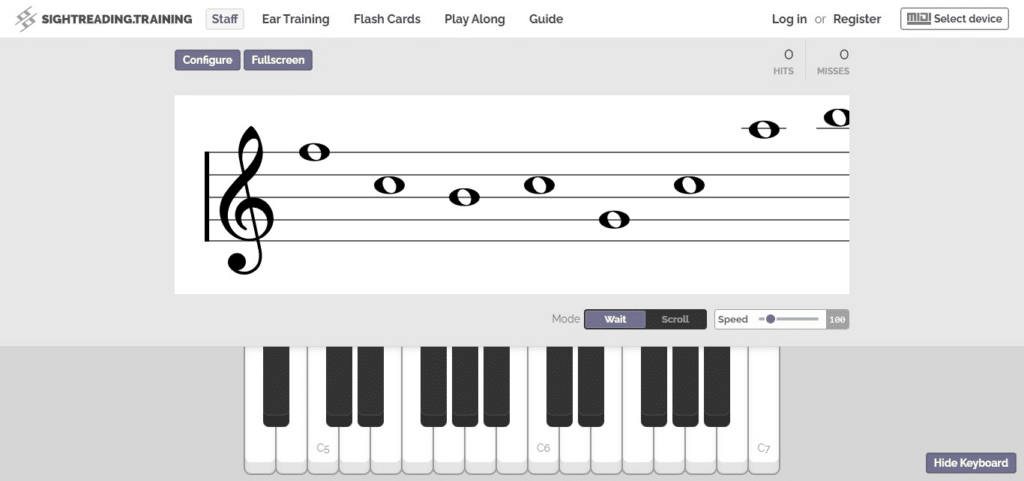
Users of the Sight Reading Trainer can progressively increase the challenge as they advance thanks to its customizable settings and adjustable tempo function. Furthermore, the application offers instantaneous feedback and performance tracking, allowing users to track their progress over time. Sight Reading Trainer is a priceless tool for improving sight-reading abilities and musical expertise, whether it is used for instrumental practice, ensemble performance, or music instruction.
26.GarageBand
Although GarageBand is most recognized as a flexible digital audio workstation for music composition, it’s also a great resource for studying music theory. GarageBand is a feature-rich interface that is easy to use for musicians of all skill levels, from novices to seasoned producers. With the app’s extensive selection of virtual instruments—which include keyboards, guitars, drums, and more—users may actively experiment with various musical ideas.

The built-in lessons in GarageBand walk users through interactive activities to encourage learning while offering lectures on basic concepts in music theory, such as chords, scales, and rhythm. Users can also apply theoretical knowledge, explore creative concepts, and make their own music with the app’s recording and editing features. With GarageBand, studying music theory and promoting musical creativity are made engaging and immersive, whether through formal instruction or self-directed inquiry.
27.SingTrue
For those who are interested in honing their musical abilities, especially in the areas of singing and ear training, SingTrue is an exceptional program. Designed with users of all skill levels in mind, SingTrue provides an extensive feature set aimed at improving vocal prowess and expanding knowledge of music theory. The software leads users through harmony exercises, pitch training, vocal warm-ups, and more with its easy-to-use design and interactive exercises. SingTrue’s novel method uses real-time feedback and visual aids to help users gain precise pitch detection and control.

Additionally, the app’s configurable lessons and progress monitoring tools let users customize their learning process and track their progress over time. SingTrue offers a flexible and efficient platform for learning music theory and enhancing vocal ability, suitable for both novices looking to build basic vocal skills and seasoned singers looking to hone their craft.
28.Uberchord | Guitar Learning
Uberchord | Guitar Learning is hailed as the best app for anyone who want to learn music theory, especially when it comes to playing the guitar. Uberchord is well-known for its user-friendly interface and extensive feature set, making it suitable for guitarists of all skill levels. The app provides a wide range of information and tools aimed at improving guitar playing and expanding one’s knowledge of music theory. Uberchord helps users learn basic concepts including chord progressions, scales, and rhythm through interactive courses, chord charts, and practice exercises.
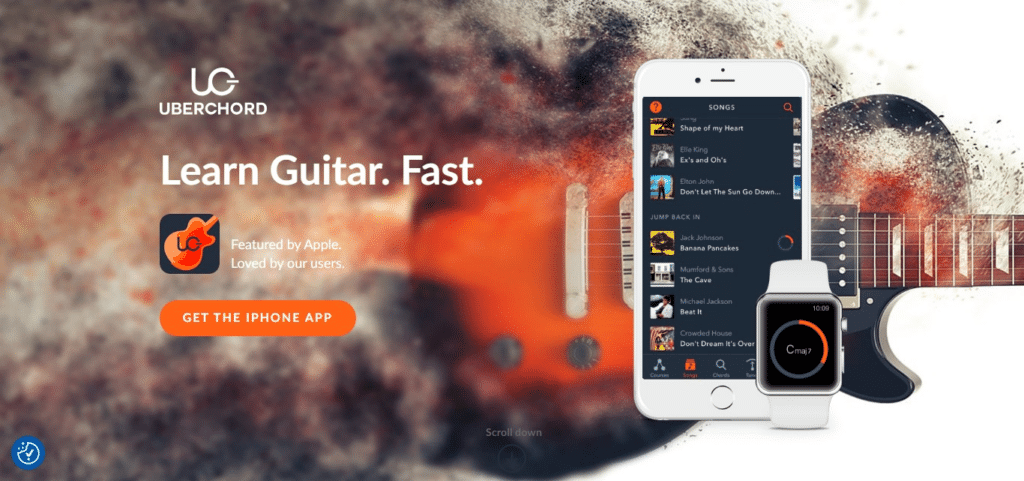
Additionally, the app’s cutting-edge technology allows users to record and share their guitar playing in real-time, giving them immediate feedback on their technique and accuracy. Uberchord allows users to customize their learning experience and track their progress over time with its unique learning paths and progress tracking capabilities. Uberchord delivers a dynamic and engaging platform for studying music theory and perfecting the art of playing the guitar, whether utilized for formal teaching or independent practice.
29.Easy Music
“Easy Music” is regarded as one of the greatest applications for people looking for a simple yet efficient method of learning music theory. From novices to more experienced musicians, “Easy Music” accommodates all skill levels with its accessible features and user-friendly layout. The program provides a streamlined method for comprehending ideas related to music theory, including chords, scales, rhythms, and notes. Users may understand essential concepts at their own pace with interactive lectures and exercises.

In addition, “Easy Music” offers useful resources like comprehension tests and ear training activities to enhance learning. Its audio examples and visual assistance help make abstract subjects more relatable, which improves comprehension and retention. “Easy Music” provides a fun and useful way to learn the fundamentals of music theory, whether it is utilized alone or in conjunction with traditional music education.
30.Moises
“Moises” stands out as a leading app for individuals eager to delve into music theory, especially concerning audio processing and analysis. While primarily recognized for its powerful features in audio manipulation, Moises also serves as an invaluable tool for learning music theory. The app allows users to isolate and extract different musical elements from audio tracks, such as vocals, instruments, and even chords. This functionality enables aspiring musicians to analyze complex musical compositions, dissecting them into their constituent parts to study chord progressions, melody lines, and harmonies.
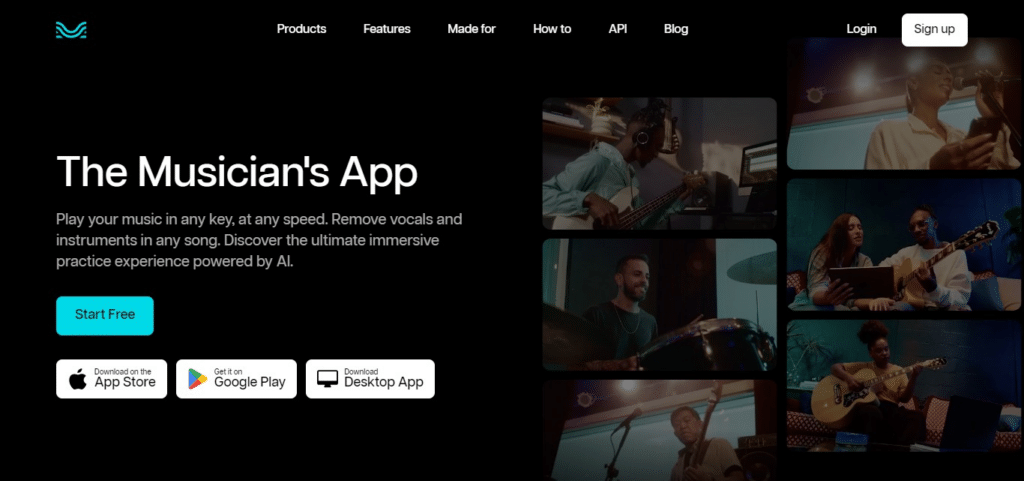
Additionally, Moises offers features for adjusting tempo and pitch, facilitating practice and experimentation with various musical elements. Whether used for studying existing songs or creating new compositions, Moises provides a dynamic and interactive platform for learning music theory and honing one’s musical skills.
What Make Apps To Learn Music Theory Unique?
Interactive Instruction: delivering practical educational opportunities.
Instantaneous Comments: Promptly correcting and advising.
Personalized Learning Paths: Designed with each person’s objectives and ability level in mind.
Multimedia Integration: Including interactive, audio, and video components is known as multimedia integration.
Gamification: Gamification is the process of transforming education into an entertaining game.
Progress Tracking: Progress tracking is keeping track of accomplishments and skill development.
Community Interaction: Facilitating connections between students and teachers.
Adaptive Algorithms: Content is modified using adaptive algorithms according to user performance.
Integration with Instruments: Integrating theory and practical application through the use of instruments.
Mobile accessibility: Using mobile devices to learn while on the go.
How Does Selected Best Apps To Learn Music Theory?
Offline Access: The ability to learn without an internet connection is known as offline access.
Ear Training Modules: Acquiring theoretical information and improving listening abilities.
Visualizations: Using images to convey abstract ideas so that they are easier to understand.
Tailored Practice Sessions: Concentrating on particular areas that require enhancement.
Offline Access: Posting achievements and updates on social networking.
Assistance from AI: Offering tailored advice and support.
Language Options: Providing support for a number of languages to users worldwide.
Integration of Notation Software: Facilitating the Composition and Arranging of Music.
Instrument Tuning Tools: This category includes instrument tuning tools.
Exercises for Sight Reading: Developing theory and sight reading abilities simultaneously.
Features Best Apps To Learn Music Theory
Instructor Support: Access to expert guidance and assistance.
Offline Storage: Saving progress and materials locally on devices.
Cross-Platform Syncing: Seamless transition between different devices.
Regular Content Updates: Keeping the app fresh with new material.
In-App Quizzes and Tests: Assessing knowledge and progress.
Virtual Reality (VR) Features: Immersive learning experiences through VR.
Accessibility Features: Catering to users with disabilities.
Integration with Music Libraries: Accessing a vast collection of music for study.
Cost-Effective Pricing: Offering affordable subscription or one-time purchase options.
Certification Programs: Providing certifications upon completion of courses.
Conclusion Best Apps To Learn Music Theory
In summary, the accessibility of advanced applications has completely changed how people study music theory. These applications provide both beginning and seasoned musicians with an interesting and useful platform with their interactive courses, real-time feedback, and tailored learning routes.
The incorporation of gamification components, multimedia resources, and community engagement augments the educational process, rendering intricate music theory ideas more pleasurable and comprehensible. These apps are expected to become more and more important as technology develops, helping aspiring musicians get a better enjoyment and comprehension of music in all its forms by helping them learn the complexities of music theory.
FAQ Best Apps To Learn Music Theory
What are the best apps for learning music theory?
Some popular apps for learning music theory include Yousician, Simply Piano, Musician, EarMaster, and Tenuto. These apps offer comprehensive lessons, interactive exercises, and progress tracking features.
Are these apps suitable for beginners?
Yes, many of these apps cater to beginners by providing introductory lessons on basic music theory concepts and gradually progressing to more advanced topics. They are designed to accommodate users of all skill levels.
Do these apps offer real-time feedback on my progress?
Yes, many apps provide real-time feedback on users’ performance, allowing them to correct mistakes and improve their understanding of music theory concepts as they practice. Progress tracking features also help users monitor their advancement over time.
Are there any free options available?
While some apps offer free versions with limited features or trial periods, others require a subscription or one-time purchase for full access to all content and features. Users can explore free options to determine which app best suits their learning needs.
Do these apps cover advanced music theory topics?
Yes, many apps offer lessons on advanced music theory topics such as harmony, composition, counterpoint, and advanced rhythmic patterns. Users can progress from fundamental concepts to more complex theoretical ideas as they advance in their musical journey










